Experiences on WebExpo 2018
Conference
- Future Frontend - A new conference to reimagine the future of the frontend - Interview with Juho Vepsäläinen
- Experiences on CSSCamp and JSCamp 2019
- Experiences on WorkerConf 2019
- Experiences on typeof 2019
- Experiences on HalfStack London 2018
- Experiences on WebCamp Zagreb 2018
- Experiences on WebExpo 2018
- GraphQL Finland - Learn GraphQL Up North - Interview with Mikhail Novikov
- Experiences on Concat 2018
- Experiences on AgentConf 2018
- Experiences on ScriptConf 2018
I was invited to WebExpo 2018 as a visitor since I spoke at the conference last year. Prague is one of my favorite cities in Europe, and the conference was good last year, so I decided to go again. Like last time, also this time most of the attendees were local, and I estimate there were roughly a thousand people in total if not more.
The event was held in the same place (Lucerna) as last year. Although a shopping mall busy with people isn't the most obvious place for a conference, I feel it works quite well. My main problem has to do with the acoustics of the main hall. They had the same problem with echo as last year, so it made it annoying to listen to the talks over a more extended period. The other halls didn't have the problem.
Overview of WebExpo 2018#
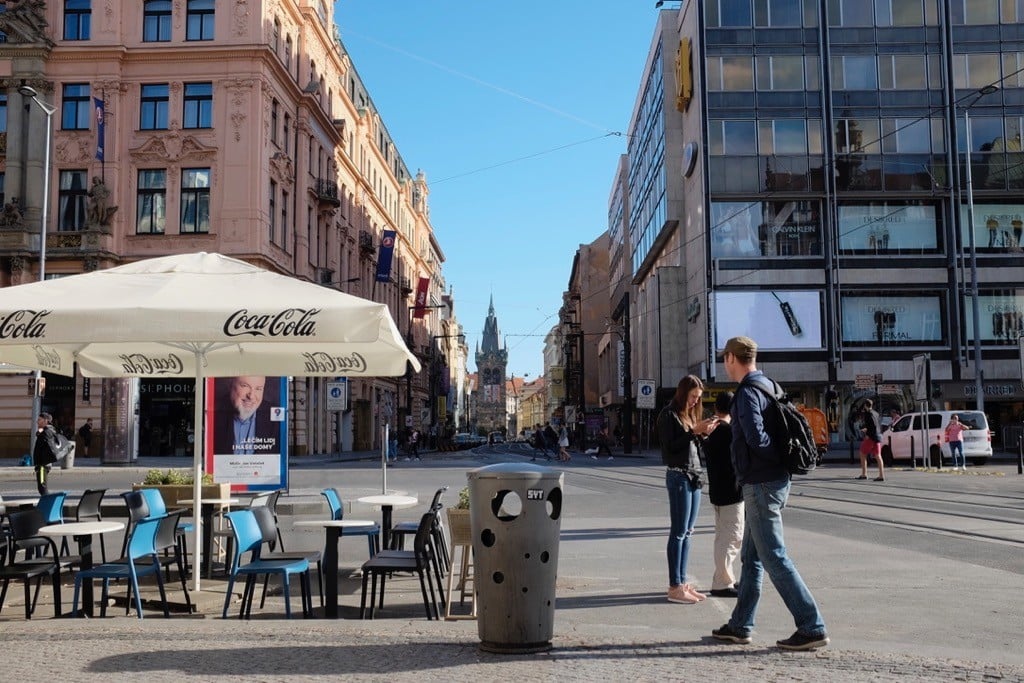
Like last year, the conference ran four tracks. The fourth track alternated between workshops and lightning talks and I didn't spend much time on it although the topics were interesting. I like the format as often purely technical conferences can get a little annoying. I gain more from design or business talks. During this year's event, there were many insightful talks about design in particular.
My only problem with the schedule was the lack of lunch breaks. It felt a little sad to skip a talk, and it mustn't have been nice for the speakers either since people need their lunch. Perhaps the way to solve this would have been to condense most talks to 30-minute format instead of 40 and putting more emphasis on lightning talks. Sometimes the talks were forced to the long format without adding much content, and sometimes the speakers knew not to push it by cutting the talks to 30-35 minute range which was fine by me.
Instead of taking questions publicly after a talk, WebExpo uses the concept of a speakers' corner where you can discuss personally with a speaker. I think it's an excellent alternative to a public QA which can get awkward sometimes. I also like the way YGLF Kiev solved the problem by having a conversation with the host after the talk.
WebExpo provided pastries and something salty to eat in the mornings. There were also reasonably paid lunch offerings and one option where you could get a hot dog against a registration (seemed to be Czech only so I skipped it). I didn't find paid lunch to be a problem as it's quite easy to find a nice meal in Prague for a reasonable cost.
Day 1#
Given I traveled from Vienna by train in the morning, I had to skip a couple of the morning talks. Perhaps next time I'll arrive in Prague the day before.
Microcopy: Your Users Will Fall in Love - Kinneret Yifrah#
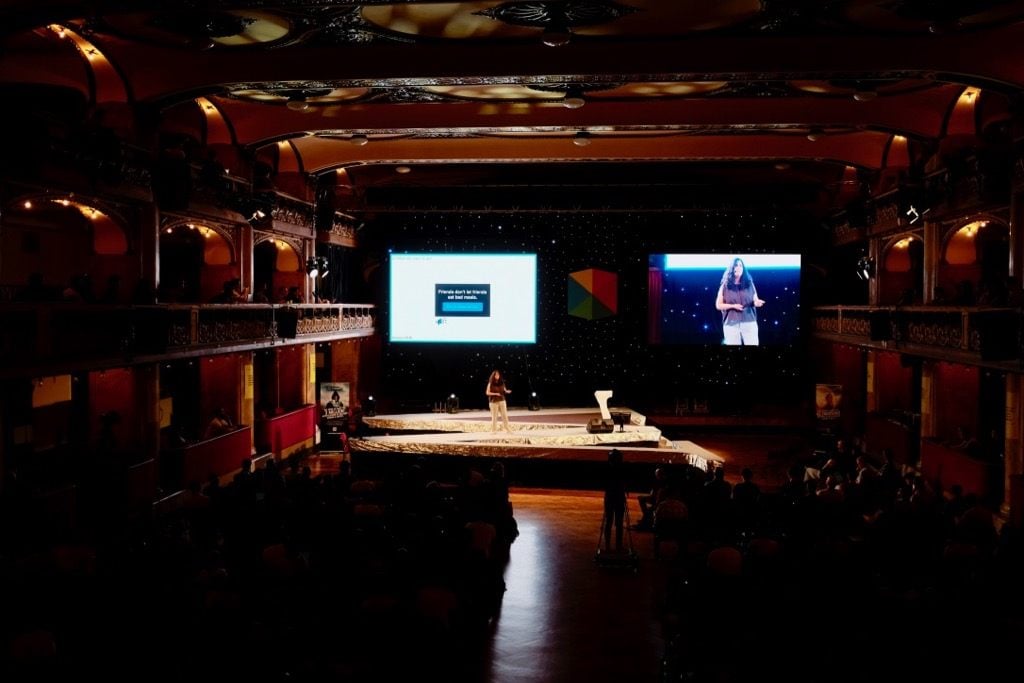
I started my day with a talk about Microcopy by Kinneret Yifrah. Her main point was simple; there are opportunities for copywriting everywhere. Instead of writing in technical terms, we should write in human terms instead. It's these small things that count. Whether you give a technical warning or error or a humane one, can make a massive difference to the user experience and brand perception.
Lead with Design - Diamond Ho#
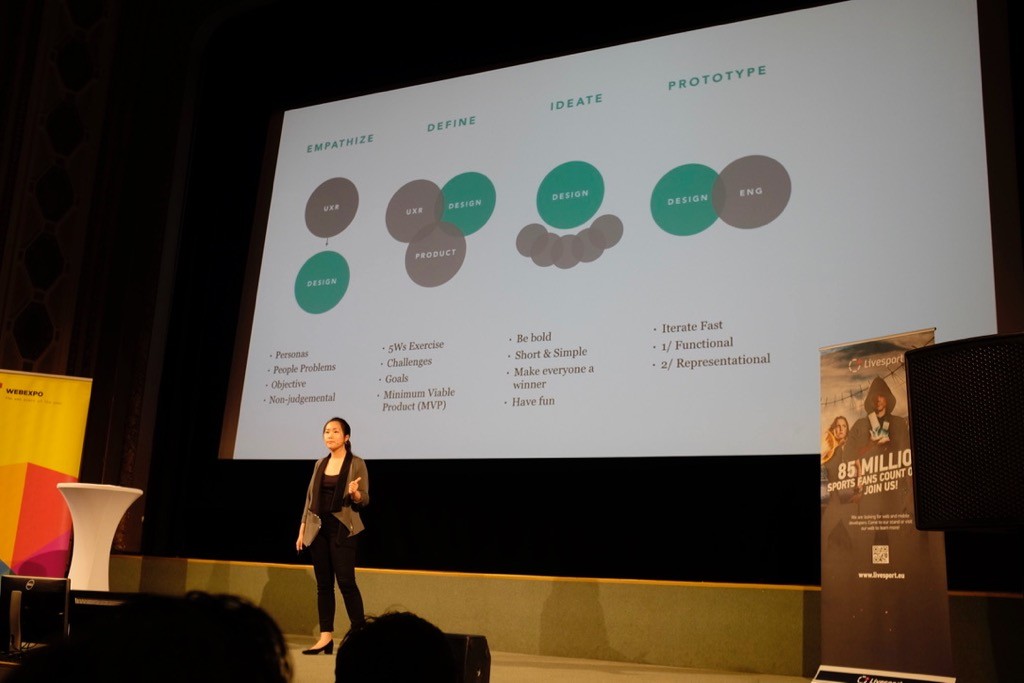
The next talk I attended, was about leading with design by Diamond Ho of Facebook. She is working in the intersection of product and design and went through the design thinking process they use at Facebook. I learned from the talk that design is a non-linear challenge even if you present it as a linear process.
The key seems to be in experimentation. For an organization like Facebook, it's essential to be able to run experiments effectively so better results can be reached considering the different stakeholders.
Another point she made is that sometimes simple design can mean a massive amount of work. What's simple from the user, can mean countless work hours for the developers implementing the feature and the changes required can cascade through the entire system. Due to this, experimentation plays a significant role as you don't have an infinite budget to use. Therefore you have to choose your experiments well.
How Can Tech Teams Help or Destroy a Startup? - Jan Řežáb#
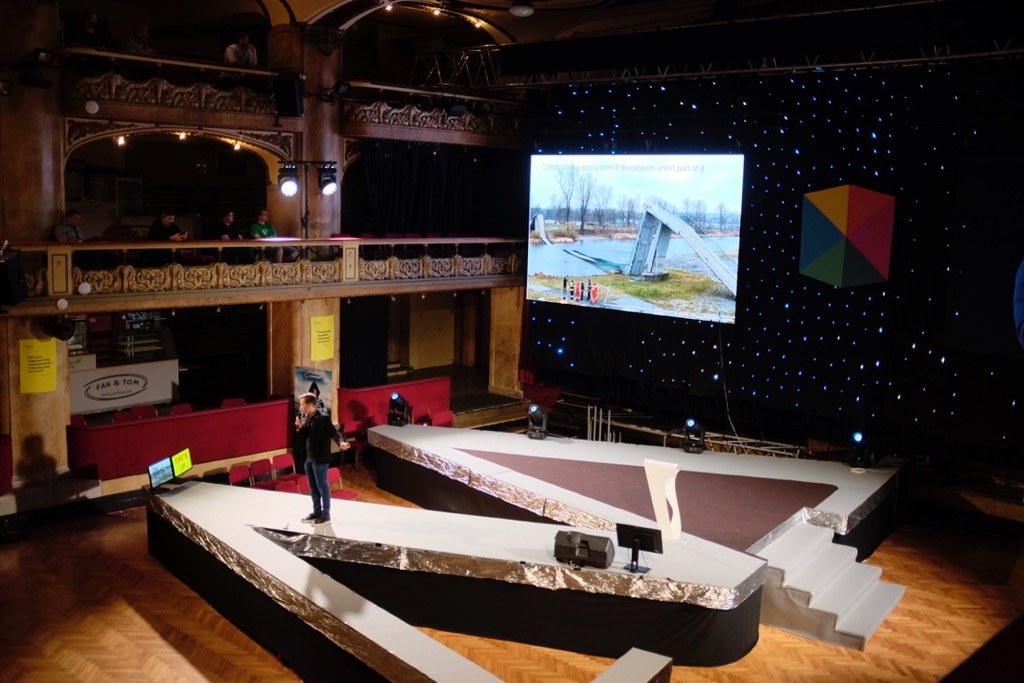
I got most of Jan Řežáb's talk about the Czech software industry accidentally, but it was interesting nevertheless. There's a sizable developer shortage in Czech (up to 50.000 developers, can it be true?) and also there's an attitude problem.
According to Jan, demotivated developers in Czech prefer to remain in their companies while doing side work for extra pay. It's something that's hurting the industry, and his advice is that people should stop doing it. I can see why but it's maybe not an easy problem to solve.
Pitching to Win - Christian Barnett#
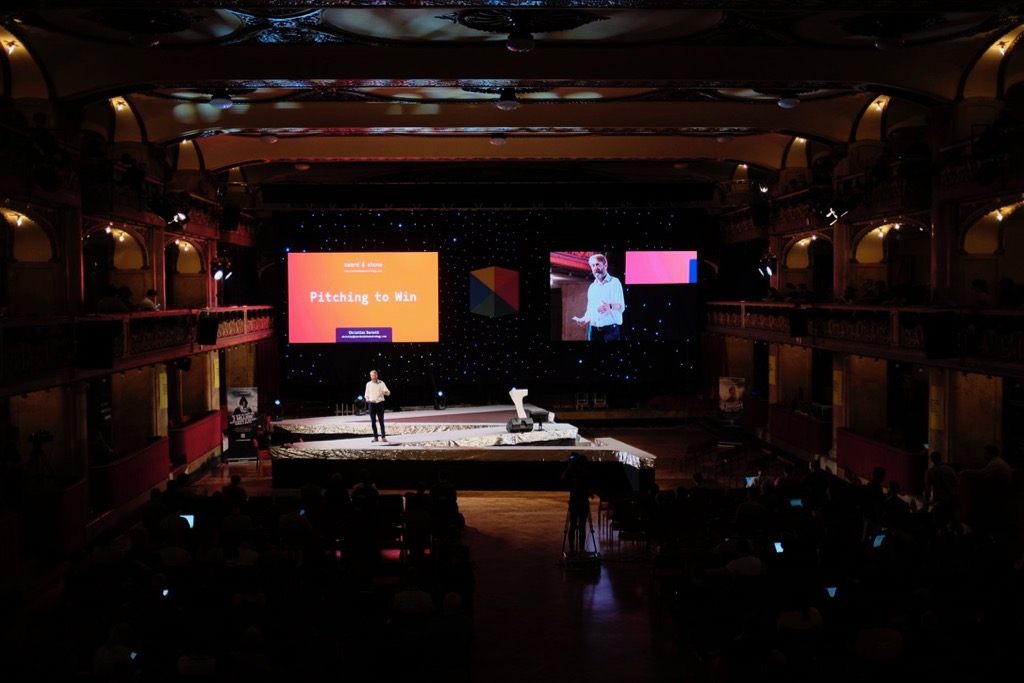
Christian's talk about pitching was the highlight of the conference for me. The speech reinforced some of my beliefs about pitching, and he highlighted techniques such as reframing the problem and putting emphasis on how people will hear you. The main point is that everyone will intercept your message through their viewpoint and needs. Therefore what is heard and gets through is different per person.
He claimed that many people put a lot of effort into creating something but not enough into how to communicate the creation. By putting more focus into pitching and how the idea is presented, has definite value as if the point isn't made correctly, it won't go through.
Christian didn't use any slides in his presentation (well, technically one to show his name) and I found this captivating. You indeed had to focus on what he had to say, and I noticed he was using several techniques, such as repetition, in his talk. He had a set of ideas in mind he wanted to get through, and I think he managed to do that most excitingly.
Design Systems at Scale - Rich Fulcher#
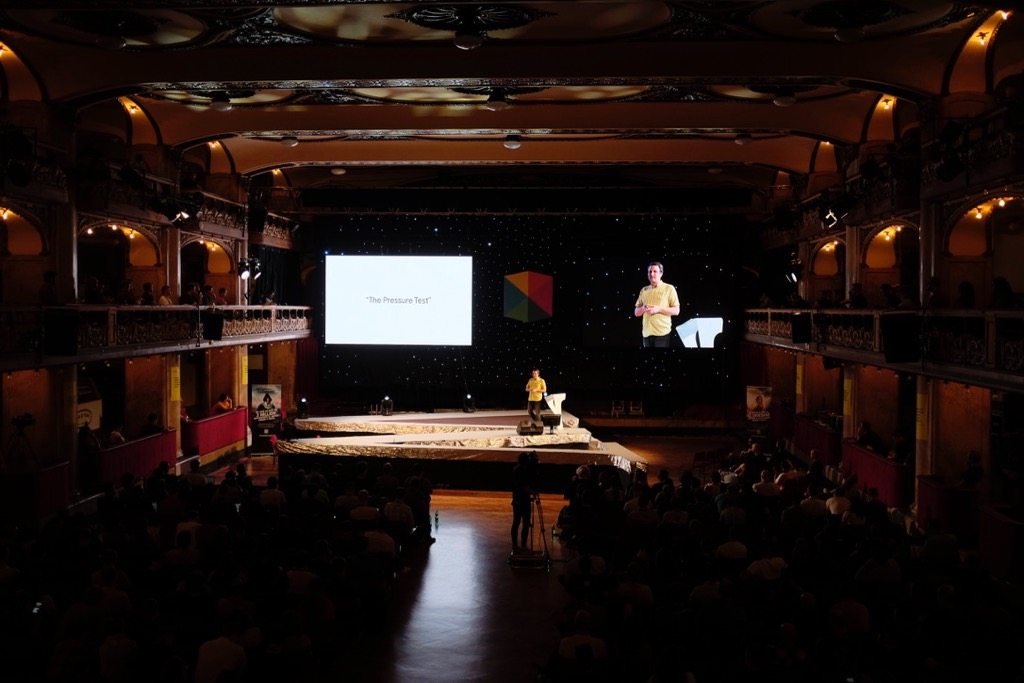
Rich Fulcher from Google discussed how they implemented design systems (the famous Material Design) in Google and the challenges they faced. Given I'm a design system convert by now, there wasn't that much new in the talk for me. The critical point was that when an organization is significant, keeping a system in sync can become a challenge.
Different units might have different ideas and needs which need to be taken into account. A design system captures concerns that might otherwise be solved differently and again be all over the place. In short, design systems allow capturing everyday needs into patterns which may be reused across the organization.
Live Demo: React.js Portals and Modern JS Apps for CMS - Tomáš Konrády#
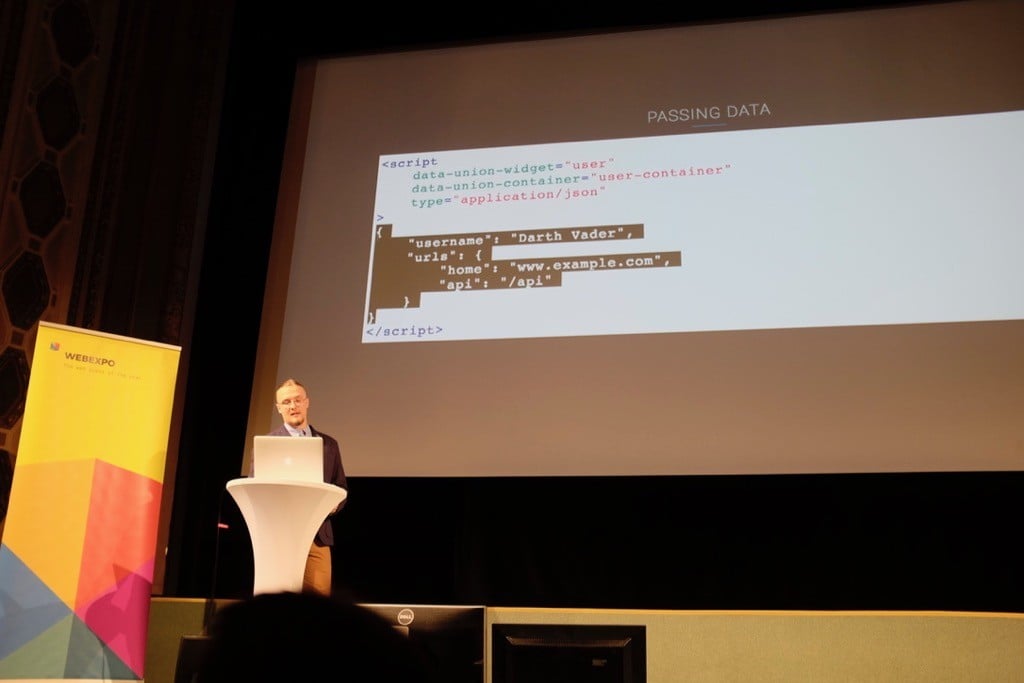
I was curious about Tomáš's talk as the topic was close to my heart given the way I develop websites these days. I've ended up using GraphQL as my CMS through GitHub and then rendering that to static HTML through React. I've found the approach fits my needs well and likely scales to new requirements as time goes by.
Tomáš did mostly the same but from a different point of view. He demonstrated how to start from a CMS such as WordPress and then integrate React with it. The result of his exploration was React Union. To tell you more about the solution, I hope to interview for this blog shortly.
Config-less, Server-less, Effort-less - Guillermo Rauch#
I wanted to see Guillermo's talk but given his speech was delayed due to a delayed flight and I was hungry, I decided to skip it and explore Prague instead. It was time to find some food, so I went to my favorite place.
Guillermo's talk and the slides are online.
Day 2#
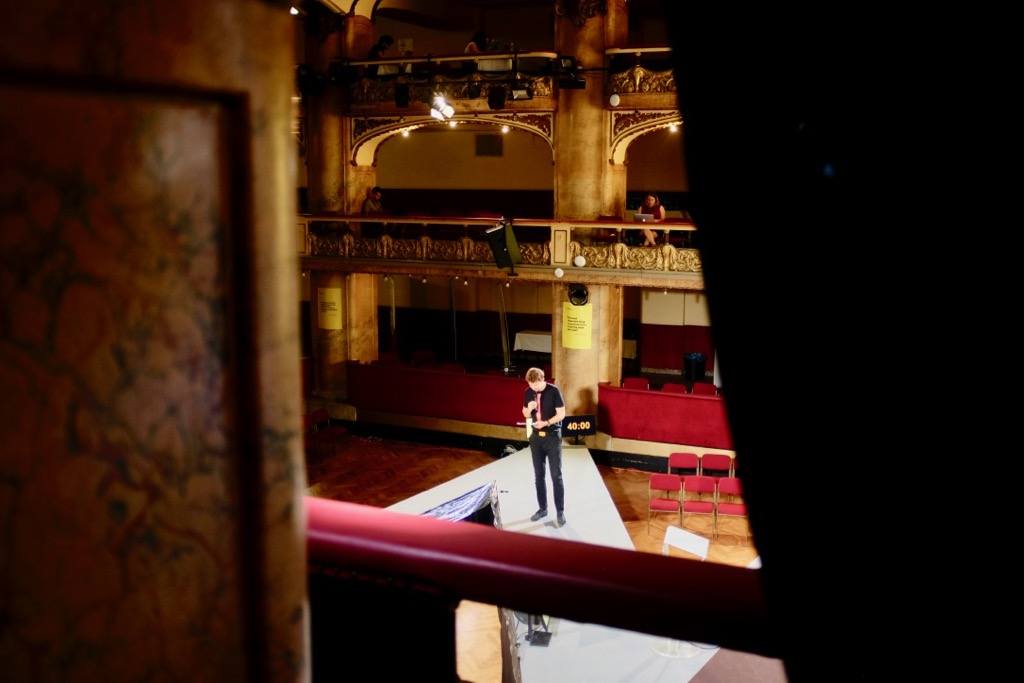
Day two of the conference continued on the same format. I skipped the morning keynote and started my day at 11.
The Cost of (not) Testing - Lukáš Linhart#
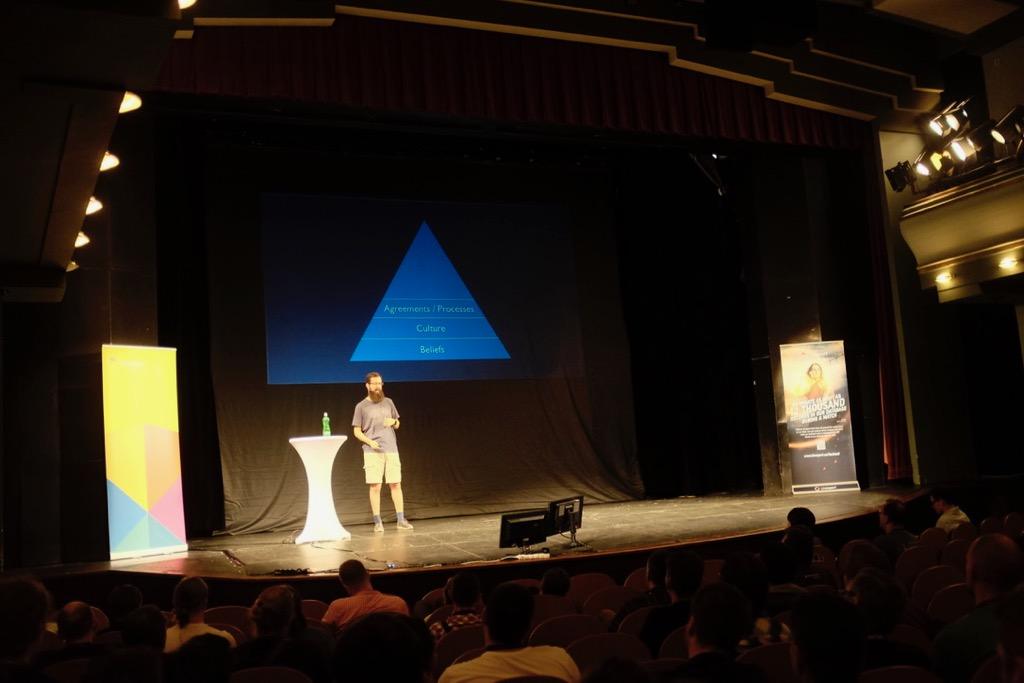
Lukáš's testing talk was one of my favorites of the conference. The main point for me is that testing is an integral part of the culture. Testing pyramid alone doesn't capture enough as it provides an only technical view of the topic. There are several layers underneath which matter more.
You should always test the aspects you cannot afford to break. Testing should be seen as a way of managing risks and defining what is acceptable in a business context. Can you afford to lose a few hours, minutes, or seconds of sales? These are the kind of limits you have to figure out and then test accordingly.
After Lukáš's talk, I went for a long lunch with a good friend and resumed the day with a presentation about workshops.
How to Design a Design Workshop - Bob Marvan#
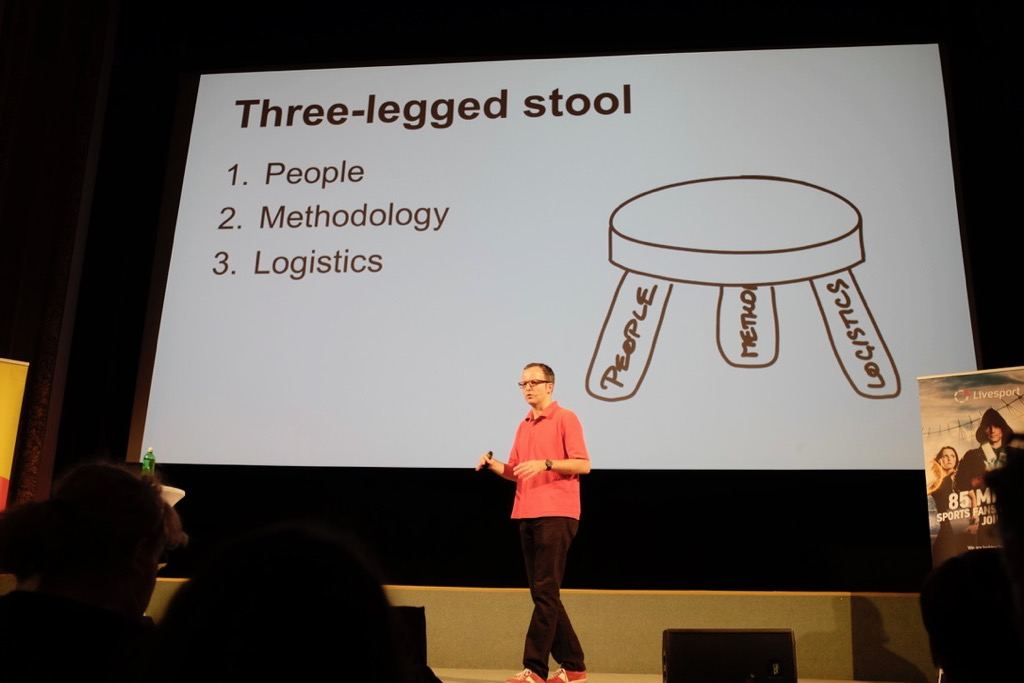
Bob's talk was about how to use design thinking to design a design thinking workshop. The core point of the talk is that the techniques used in a design workshop can be useful for developing the workshop itself. He also made critical points about managing people and distributing responsibility.
He also made a point about energy. If you start a workshop strong, it will be easier to sustain a high energy level during it although it might inevitably go down over time. His point about using psychology to make people learn was great. Workshops are about compressing people concerning focus, and that's what you should use to your advantage to gain good outcomes.
Design is Communication - Pascal Heynol#

Pascal's talk was about his progress as a designer and what design means to him. He re-iterated Shannon's theory of communication and pointed out design follows the same model since the purpose of design is to communicate an idea. Considering that, you can evaluate your design and the aspects affecting it.
CSS in JS: Patterns - Vojtěch Mikšů#
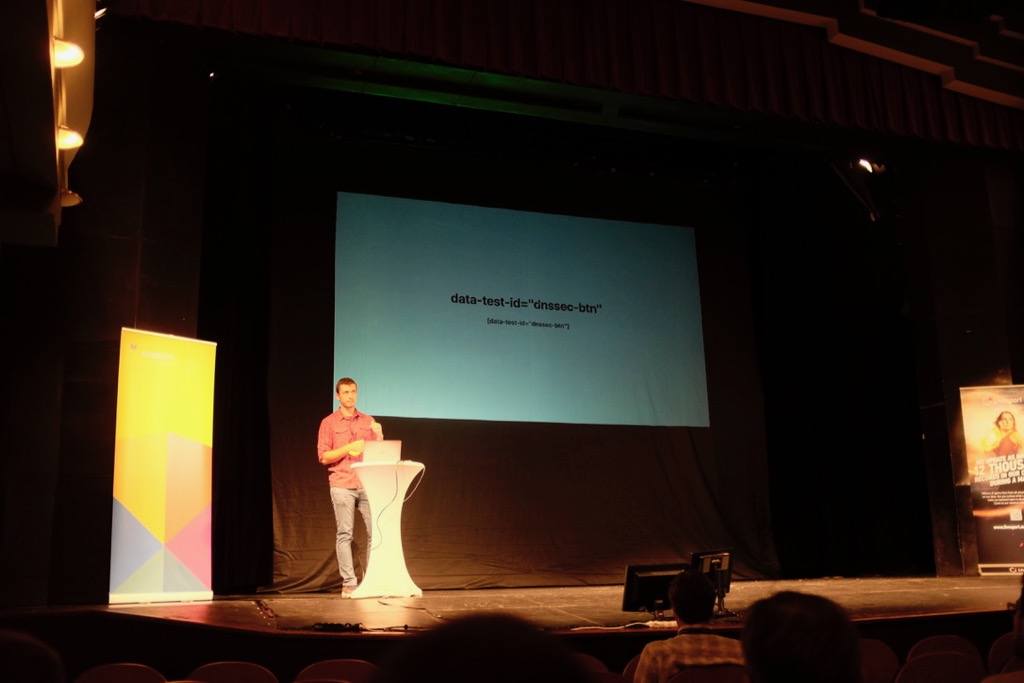
Vojtěch's talk was about the adoption of CSS in JS within Cloudflare and how they achieved the transformation. Given I am going through a similar change in my work, it was interesting to notice the parallels. His problems were in larger scale given he works as a part of the large engineering organization. In that case, the critical point was documenting the approach well beyond the official documentation. He stated that the solution you choose doesn't matter as it's more about mindset since it's relatively easy to move between the technical solutions as needed.
Constant Curiosity: How Brands Earn Trust by Asking Firecracker Questions - Jon Burkhart#
I skipped Jon's talk but the presentation and the slides are online. My current work isn't brand oriented, but I may check the talk later when it becomes more relevant.
Conclusion#

I think WebExpo was a solid event this year too. I hope they make space for lunch in the next year's schedule and compress most talks to a shorter format (personal preference). I also hope they manage to solve the acoustics issue in the main hall. Apart from these minor issues, I look forward to the event again.